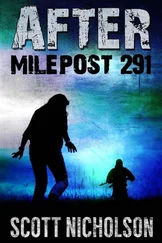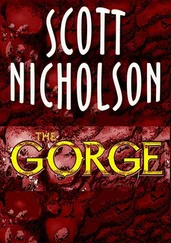Scott Nicholson - Ashes
Здесь есть возможность читать онлайн «Scott Nicholson - Ashes» весь текст электронной книги совершенно бесплатно (целиком полную версию без сокращений). В некоторых случаях можно слушать аудио, скачать через торрент в формате fb2 и присутствует краткое содержание. Жанр: Триллер, на английском языке. Описание произведения, (предисловие) а так же отзывы посетителей доступны на портале библиотеки ЛибКат.
- Название:Ashes
- Автор:
- Жанр:
- Год:неизвестен
- ISBN:нет данных
- Рейтинг книги:3 / 5. Голосов: 1
-
Избранное:Добавить в избранное
- Отзывы:
-
Ваша оценка:
- 60
- 1
- 2
- 3
- 4
- 5
Ashes: краткое содержание, описание и аннотация
Предлагаем к чтению аннотацию, описание, краткое содержание или предисловие (зависит от того, что написал сам автор книги «Ashes»). Если вы не нашли необходимую информацию о книге — напишите в комментариях, мы постараемся отыскать её.
Ashes — читать онлайн бесплатно полную книгу (весь текст) целиком
Ниже представлен текст книги, разбитый по страницам. Система сохранения места последней прочитанной страницы, позволяет с удобством читать онлайн бесплатно книгу «Ashes», без необходимости каждый раз заново искать на чём Вы остановились. Поставьте закладку, и сможете в любой момент перейти на страницу, на которой закончили чтение.
Интервал:
Закладка:
I looked around at the great blue sea. The horizon was empty on all sides, a far cry from the past glories of this area's navigational history. In my research, I had learned that this inlet was one of the first great shipping routes in the south. Decades before the Revolutionary War, ships would come to the shallow neck and offload their goods to smaller boats. Those boats then distributed the cargo to towns across the mainland shore. Spurred by this industry, Portsmouth had grown up from the bleak gray-white sands.
"A lot of shipwrecks below?" I asked, more to keep the old man talking than to fill any gaps in my background knowledge.
"Hells of them," he said. "Got everything from old three-mast schooners to a few iron freighters. Some of them hippie divers from Wood's Hole said they saw a German U-boat down there, but they was probably just smoking something funny."
"So the bottom's not too deep here?"
"Depends. The way the sand shifts here from one year to the next, could be fifteen feet, could be a hundred. That's why the big boys don't come through here no more."
And that's why Portsmouth had died. As the inlet became shallower, ships no longer wanted to risk getting stranded or else breaking up on the barrier reefs. The town had tried to adapt to its misfortune, and was once an outpost for ship rescue teams near the end of the 19th century. More than a few of the town's oarsmen were lost in futile rescue or salvage attempts.
Then ships began avoiding the area entirely, and the town residents left, family by family. The population dwindled from its height of 700 to a few dozen in the 1950s. The stubborn Portsmouth natives continued to cling to their home soil despite the lack of electricity, no steady food supply, irregular mail service, and a dearth of doctors and teachers. But even the hardiest finally relented and moved across the sound to a safer and less harsh existence, leaving behind a ghost town, the buildings virtually intact.
"There she is," the boatman said, and I squinted against the sparkling water. The thin strand came slowly into view. The beach was beautiful but bleak, a scattering of gulls the only movement besides the softly swaying seagrass. Low dunes rolled away from the flat white sands.
"Used to be a lot of wrecks right along this stretch," the boatman said.
"I read that they'd go out in hurricanes to rescue shipwrecked crews," I said.
"Brave folks, they was," he said, nodding. "'Course, you'd have to be brave to set down roots in that soil, or else crazy. My people came from here, but they left around the First World War, when the getting was good. They's still lots of them on the island, though."
I was confused. "I thought the town was abandoned, except for the rangers."
He gave his dolphin-squeak of laughter. "Them that's under the sand, I mean. In the cemeteries. Got left where they was buried."
He guided the boat toward a crippled dock that was barely more than black posts jutting from the shallow water. The engine dropped to a groaning whine as he eased back the throttle. When we came broadside to the dock, he tied off with his crablike hands. I climbed out onto the slick, rotted planks.
"You ever go back?" I asked. "To have a look around, to walk through the houses that your folks used to live in?"
He studied the swirling foam and shook his head. "Nope. The past is best left dead and buried. You'd be wise to remember that."
I took my baggage from him, and I thought he might at least help me carry it to dry land. But he didn't move from the helm.
"You'll meet me here at four o'clock on Friday?" I asked.
He nodded, avoiding my eyes. "Unless a hurricane blows up, I'll be here."
"I trust the check came through okay?" I knew that publishers' checks could sometimes be excruciatingly slow in arriving, and I didn't want my ticket back to the mainland to be voided. This man was my only link with civilization, unless I somehow gained access to the short-wave radios.
"The money's good," he said. "I reckon that's the only reason you're doing this."
"That, plus I'm curious," I said. "There's not many places where a person can get lost in time anymore."
"Just make sure you don't get too lost," he said. "See you on Friday. Be sure and stay out of the houses, and for the Good Lord's sake, don't go in the graveyards."
He untied and shoved away, then turned the rudder until his back was to me. I waved, but he didn't turn around. The boat was out of sight by the time I had wrestled my bags up to the sandy hills that protected the island from the worst of the wind.
As I crested the dunes, the dead homes of Portsmouth lay sprawled before me. They were as gray-white as the ground, the paint flaked from the Colonial-style houses by decades of natural sand-blasting. The houses were hundreds of feet apart, all perched several feet off the ground by concrete or brick piers. A few water oaks and scrubby jack pines filled the expansive gaps between the structures. I set down my bags on the first porch I came to, at a three-story home that was the tallest on the island.
I didn't believe the boatman that the island was completely lifeless. Even if the ranger stations were abandoned, surely a few campers or day-tripping sailors were on the island. I didn't think my equipment would be stolen, but my laptop was worth several thousand dollars. And if my food supplies were stolen, I couldn't walk around the corner to a convenience store and replenish them.
Despite the boatman's warning, I entered the house, the old dark pine boards groaning under my feet. The shade was a relief from the August sun, and the narrow windows broke the breeze until it was comforting instead of brutal. The several rooms on the bottom floor were empty. I found the stairs to the left of the parlor and climbed the well-dried treads. On the second floor, I found a couple of old chairs, one a rocker. I then explored the third floor, which was barely more than a gabled attic. The view was spectacular from the lone window, and I could see most of the town as well as both the lee and Atlantic shores, since the island was scarcely a mile wide. The window also had a small ledge suitable for typing. I determined to make the room my headquarters for the brief duration of my visit.
Under park rules, visitors could tour the homes but were forbidden to stay in them. I was usually scrupulous about such matters, but if even the rangers had left this place to the elements, then I rationalized my squatter's rights by the fact that I myself was a natural force. Besides, after my article came out, perhaps renewed interest in the place could generate some users' fees for the National Park Service. Good publicity never hurt come budget time.
The sun was sliding rapidly behind the sea to the west. I stuck my supplies in a dark doorless closet, carried the rocker up to the room, and sat before the window to rest. Looking down, I imagined the town as it must have been a hundred-and-fifty years ago, with a bustling trade down by the shore, children running through the rutted sandy streets, women in long dresses going about their business. Perhaps a horse or two, certainly no more, had plodded along pulling carts laden with shipping goods, kegs of water, thick coils of rope, and sacks of meal or flour. I could almost hear the sailors' cries and shanties as they loaded and unloaded their longboats.
Behind an old drooping oak to the north lay a gated cemetery. Some of the markers had fallen over, and the few angels and crosses that still stood against the wind were pitted and worn. I thought of the boatman's words, how the cemeteries should be avoided. But nothing wrote out the history of a place better than the names and dates of its dead, and I knew I could not resist visiting them.
I may have dozed, though I rarely slept before the sun did. The next thing I knew, I was walking in the cemetery, feet bare against the wiry grass. The sky was a deep azure, moving toward a nearly starless twilight. The sea breeze moaned between the marble markers, the air tasting of salt and seaweed and driftwood.
Читать дальшеИнтервал:
Закладка:
Похожие книги на «Ashes»
Представляем Вашему вниманию похожие книги на «Ashes» списком для выбора. Мы отобрали схожую по названию и смыслу литературу в надежде предоставить читателям больше вариантов отыскать новые, интересные, ещё непрочитанные произведения.
Обсуждение, отзывы о книге «Ashes» и просто собственные мнения читателей. Оставьте ваши комментарии, напишите, что Вы думаете о произведении, его смысле или главных героях. Укажите что конкретно понравилось, а что нет, и почему Вы так считаете.












